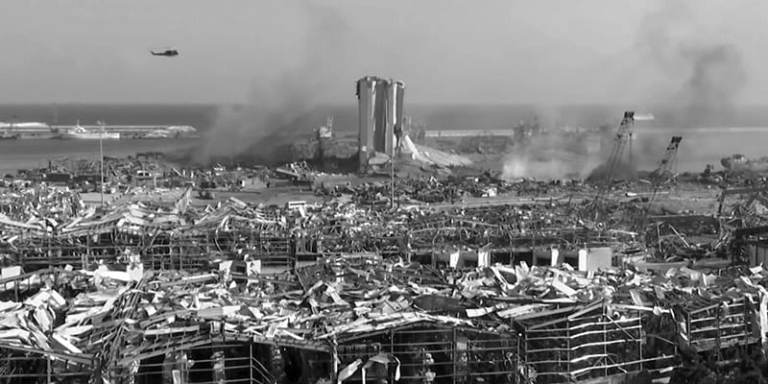
The explosions that destroyed the Port of Beirut on August 4th are the most recent in a series of catastrophic events that have befallen Lebanon and its people. The latest count of casualties was over 154 killed and 5,000 injured at hospitals in the capital that have run out of space to receive more. Three hundred thousand others have also been made homeless. Rescue crews are still looking for missing persons under the rubble.
These explosions came as the country was approaching the proverbial abyss caused by a corrupt political system, one that has produced a failed state and ineffective institutions, an unscrupulous political and economic elite, and ever-deepening socioeconomic woes. But beyond these grievous and painful factors, the destruction of the port alone is a profound event that will have long-term consequences for the country and its economy and, most of all, its people. Recovery from this will take a very long time and cost dearly, two conditions that the Lebanese can ill afford.
Such a recovery will also have to address the endemic and prevalent malfeasance that has permeated Lebanon’s institutions––executive, legislative, Judicial, and economic and financial. News reports about what transpired at the port have pointed to well-known facts in the country’s official life: corruption, negligence, and carelessness that have hardly ever been met with the accountability measures required of a modern political system. On the day of the disaster, government and security agencies were absent from the scene of the explosions for hours, leaving journalists, observers, civilians, and others to speculate about what happened at Lebanon’s most strategic economic asset. The country’s Higher Military Council declared Beirut a stricken city and announced a state of emergency for two weeks. What is certain now is that domestic efforts and regional and international assistance will be urgently needed to help deal with the widespread destruction and devastation.
Five fellows and affiliated scholars and experts of Arab Center Washington DC (ACW) were invited to offer opinions and analyses regarding this latest development and what it means for Lebanon and its future recovery. Their responses are below.
Mary-Jane Deeb, Member, ACW Board of Directors
As we watched in horror the explosion at the Port of Beirut on TV, our thoughts first turned to our families and friends living in that tortured city. After frantic calls to check that everyone was safe, we were overwhelmed by the news of the number of casualties and homeless. This in a country already reeling from the worst economic crisis in its modern history, a COVID-19 pandemic that has stressed its health care system, and a 1.5 million Syrian refugee population that has stretched Lebanon’s infrastructure to its limits.
Rather than deal with its problems piecemeal, a grand strategy for Lebanon is needed, a Marshall Plan for reconstruction that would be put into place rapidly and that would address all its problems at once. First, the Port of Beirut should be the primary focus and funding should be channeled there to clean up the area, bring in construction materials, and hire workers for reconstruction. Second, the problem of re-housing the 300,000 displaced people must be addressed with loans to individuals to help them salvage, fix, or rebuild their homes. Third, there should be a focus on the physical infrastructure that has been shattered by the explosion; roads, electrical systems, water distribution, waste management, and communications should be priorities.
Fourth, funding should be channeled to the health care system, which has been stretched to the limit with the pandemic and now with 5,000 additional casualties who require medical care. Existing hospitals will need financial and infrastructural support, and more health clinics need to be built throughout the country. Fifth, education must also be at the forefront of the planning, as students are getting ready to go back to school while universities and schools are cutting down on staff and faculty because they cannot afford to pay them. Sixth, the banking sector is critical to the Lebanese economy; if it is rescued and strengthened by the IMF and the World Bank with major loans, it could restore trust in Lebanon’s economic viability.
But for this rescue package to succeed in addressing Lebanon’s problems, any funding should be international and come from the European Union, the United Nations, and the Gulf Arab states. Every aspect of the plan should be overseen by international administrators and not be entrusted to local officials because of their long-known corrupt practices. Finally, there should be an international force, like the UNIFIL in southern Lebanon, to ensure the security of the international administrators and to arbitrate in case of conflict.
Jean AbiNader, Arab American Community Leader
The explosions at the Port of Beirut mirror the overall situation in Lebanon: a disaster that was waiting to happen due to mismanagement, corruption, and lack of accountability. Many people are dead, thousands injured, hundreds still missing. The Arab and international communities have pledged support and assistance. Will the people who need the help––i.e., the Lebanese––get it? Will the clean-up after the explosions be postponed while the country’s leadership dithers about how to allocate the contracts for reconstruction?
I realize that taking a hard line now may seem out of place, but I have relatives in Lebanon, at least five families in the areas adjacent to the explosions whose homes are a mess. My cousins are doctors at Lebanese American University and American University of Beirut who are overwhelmed with the suffering and dying. At the same time, world leaders try to sort out how to support the people without caving in on finally addressing needed reforms in the country. God willing, the international assistance will be a starting point for these reforms to restore a healthy Lebanon to the Lebanese people and others living in the country.
Patricia Karam, Middle East North Africa Regional Director, International Republican Institute
Lebanon, a country on the edge, literally collapsed on Tuesday, August 4th, with an explosion that rocked the capital, Beirut. In addition to the numbers of casualties and homeless, the governor of Beirut estimated the cost of the damage at between $10 and $15 billion. Already grappling with the most severe economic crisis of its existence that has been exacerbated by COVID-19, Lebanon could not be more unprepared for this catastrophe.
But in Lebanon anything can happen, can’t it? Very quickly, a number of theories circulated, most widely attributing the blast to a Hezbollah bomb or an Israeli missile strike. Then, the government declared the explosion to have been an accident, caused by some 2,700 tons of highly combustible ammonium nitrate left to fester, since 2014, in a container at the port in the sweltering heat. The port area, incidentally, is controlled by Iran-backed Hezbollah, which has exclusive control of the government. Were the blast deliberate, the Lebanese public would not have been entirely surprised, whether it was an Israeli strike on a presumed arms depot or a deliberate action by Hezbollah to divert attention from an upcoming tribunal verdict––now postponed until August 18––that will indict four Hezbollah operatives in the 2005 assassination of former Prime Minister Rafic Hariri. After all, the Lebanese have seen and lived through everything. An accident, however, is all the more tragic, as it is the manifestation of governance and institutions that are rotten to the core. An accident is worse because it means that a good part of the city was flattened because nobody cares.
Lebanon’s corrupt elite have stolen and pillaged the country with complete disregard to the well-being of the population. The Lebanese kleptocracy is one where plutocrats, oligarchs, and warlords have, for decades, legalized opportunities to steal from citizens. Examples abound, with the most egregious being the Ponzi scheme perpetrated by banks that led to the current economic crisis, allowing large capital to qualify for loans in dollars at low rates and earn high interest from Lebanese pound deposits, as long as the exchange rate was pegged at 1,500 Lebanese pounds to the US dollar. This failed but deliberate measure became a way for the political class to enrich itself by mortgaging the future. There are many other examples, such as the executive orders and legislation authorizing the sale of public lands, notably seashore and riverside tracts, at a highly advantageous price to a consortium of plutocrats. The 2015 trash crisis, during which mountains of garbage built up in the streets, unfolded while the elite wrestled over the spoils of lucrative waste management contracts. The exceptional mismanagement of electricity—with aging power plants, a generator mafia, and Hezbollah’s insertion of associates into corrupt deal making—is costing the state 40 percent of its debt and causing daily brownouts. And so on.
Now a large part of the city is destroyed. How does a people—which has endured 15 years of a brutal, sectarian civil war and decades of abysmal governance and dysfunction since, and now economic and health crises—survive this? The entire kleptocratic class and its patrons need to be brought to account for chronic mismanagement and criminal negligence. It is hard to see how the current state of shock will not translate into anger in demanding change or reform. The question is, can it be channeled positively or will it cause more decay? The Lebanese have nothing more to lose.
Imad K. Harb, Director of Research, ACW
There is no question that the blasts at the Port of Beirut are the result of a serious laxity in both responsible supervision at the facility and vigilance to protect the neighborhood from unforeseen dangers. The explosions also present an example of the ineptitude of individuals usually hired on a sectarian basis without regard to their qualifications; such workers may not believe they are responsible for the general good because their positions are secure, therefore they do not fear accountability.
Nevertheless, this latest calamity is first and foremost reflective of the weak status of the Lebanese state. Although purportedly a collective of modern institutions set up and dedicated to serve the people of Lebanon, the state has failed miserably in fulfilling this mission. Many in the country also decry Hezbollah’s special status at the port, which it uses to its advantage without interference from the authorities; this only adds to the perception that the state has lost its position as a sovereign entity over all of its territory.
Indeed, it is how this state behaves and what it does that prompt or impede its bureaucrats and officials to perform their duties. Lebanon’s polity––and especially after the civil war of 1975-1990––is built around the idea of efforts toward mutual and constant compromise that, necessarily, require either half-measures to satisfy the basic needs of agreement or willful avoidance of disagreement lest discord and violence ensue. Such a state is unlikely to be able to demand full compliance with good governance from its officials or to exact sanctions when they fail. And this goes back squarely to the question of public accountability.
Repercussions from the explosions at the port will surely be profoundly detrimental to the economy and people of Lebanon. However, they will not lead to a change in how the state conducts its business unless Lebanon’s political elites are replaced or finally alter the way they understand governance and responsibility toward their citizens, expatriate workers, and refugees living in the country.
Nabeel A. Khoury, Nonresident Senior Fellow, Atlantic Council
According to an old Phoenician legend, Lebanon dies but repeatedly rises from the ashes. After historic fires, foreign invasions, and civil wars, this old adage seemed to ring true, especially for the Lebanese who have always thought of themselves as survivors. When you add to all the calamities above, however, the deep-seated corruption and criminal negligence that have been eating away at Lebanon over the past few decades, it is hard to continue believing in the legend and to see a light at the end of this dark tunnel.
Hundreds of thousands of Lebanese rose against their government last October, protesting not only the lack of basic services and a fast sinking economy but what they saw as the root of Lebanon’s problems: a deeply divided sectarian feudal system that is consumed by the effort to achieve consensus—and not for the sake of rebuilding the country after a 15-year civil war but for agreeing on how exactly to divide the spoils of governance. There has been no progress in the country on restoring electric power, providing clean water, and dealing with trash literally lining many city streets because leaders cannot agree on who among them would get the kickback from the contracts that need to be awarded in each case.
To make matters worse, a Ponzi-style scheme between politicians, private banks, and Lebanon’s central bank has bankrupted the country. Lebanon’s power elites continue to enjoy the funds they deposited in foreign banks as ordinary Lebanese are now routinely denied access to their foreign currency funds. The banks will give the ordinary citizen the Lebanese equivalent of their dollar holdings at an official rate, which is fast depreciating against market rates and commodity prices. The devastating explosion in downtown Beirut will further fuel the anger of an impoverished population already suffering from the humiliation of a neglectful and deceitful political elite. The months ahead will bring nothing but further chaos and violence to the streets of Lebanon’s major cities.





